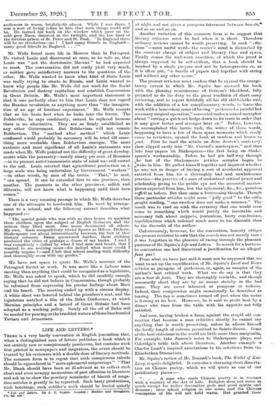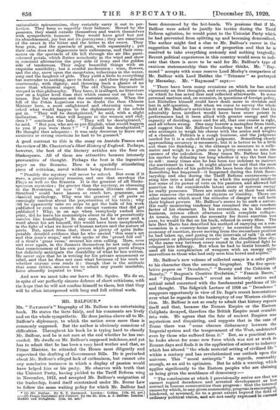LIFE AND LETTERS.*
THERE is a very hardy convention in English journalism that, when a distinguished man of letters publishes a book which is not entirely new or conspicuously ponderous, but contains work first printed in newspapers and magazines, the event should be treated by his reviewers with a double dose of literary rectitude. The common form is to regret that such conspicuous talents should be squandered in " mere ephemeral outpourings." " That Mr. Blank should have been so ill-advised as to collect such short and even scrappy mementoes of pest effusions in literature and ask us to chew the powdery remainder of biscuit of maga- zine articles is greatly to be regretted. Such hasty productions, such botching, such cobbler's work should be buried quietly
• Late and Laura By J. 0. Squire. London : Hodder and Stoughton. 17s. ad. ass,
at night and not given a pompous interment between boards,* and so on and so on.
Another variation of this common form is to suggest that literary criticism must be bad when it is short. Therefore ordinary reviews cannot be worth preserving. In such " effu- sions "—most useful word—the reader's mind is distracted by the constant change of subject and literary time and grace. Finally comes the well-worn assertion, of which the proof is always supposed to be self-evident, that a book should be inspired by a single purpose and not be heterogeneous or, as it is often put, "a bundle of papers tied together with string and without any other nexus."
The present reviewer must confess that he opened the orange- tawny covers in which Mr. Squire has encased his book
with the pleasing reminiscence of Bottom's blackbird, fully prepared to do his duty to the great tradition of short essay reviewing, and to repeat faithfully all his old shibboleths and,
with the addition of a few complimentary words, to leave the work with a benevolent sense of having " performed a painful but necessary surgical operation," concealed under a mixed metaphor about "cutting a quick-set hedge down to its roots in order that it may grow better and stronger later on." Before, however, he accomplished this heroic task, the writer of these words, happening to have a few of those spare moments which rarely come to reviewers, opened the book at random and began to read. First he read the article on Jane Austen's centenary, then slipped easily into " Mr. Conrad's masterpiece," and then into four papers on Shakespeare—the first being on Shake- speare's workmanship. Before he had got half-way through the last of the Shakespeare articles scruples began to („wake in him. He pulled himself together and inquired whether he was not in danger of having a sort of accidental approval extorted from him for a thoroughly bad and unwholesome practice—the practice of a man of undoubted critical power and scholarship giving to the public eye not the measured master- pieces expected from him, but the ephemeral, &e., &c., quantum aufficit as before. But then came a buttressing thought. Though these particular articles might seem " jolly good " to the critic caught reading, " one swallow does not make a summer." The result was to read on with the certainty that one would soon come to something which would justify the inevitable and necessary talk about snippets, journalism, hasty conclusions, republications which redound much more to his discredit than to the discredit of the author.
Unfortunately, however, for the convention, honesty obliges the present reviewer to own that the search was not merely vain ; it was forgotten in the pleasure of racing through the pleasant pastures of Mr. Squire's Life and Lettere. In search for a buttress to convention one had discovered a justification for an alleged faux pan 1 From what we have just said it must not be supposed that we want to set up the republication of Mr. Squire's Land and Water articles as paragons of perfection, or, again, as samples of the author's best critical work. What we do say is that they are a tour de force. They are thoroughly readable, and though necessarily short they are by no means sketchy in the bad sense. They are never laboured or pompous or tedious. Indeed, their compression might occasionally be described as teasing. The tap is sometimes turned off just when the water is flowing at its best. However, he is said to profit best by a dinner who rises from the table with his appetite not fully satisfied.
And now, having broken a lance against the stupid old con- vention that because a man criticizes shortly lie cannot say anything that is worth preserving, unless be allows himself the lordly length of column permitted to Sainte-Beuve. Some of the best criticisms in the world are little more than marginalia, For example, take Jonson's notes to Shakespeare plays, and Coleridge's table talk about literature. Another example fa Charlet, Lamb's inspired annotations to his selections from the Elizabethan Dramatists.
Mr. Squire's review of Mr. Bramah's book, The Wallet of Kai- Lung, is quite delightful. It contains a charming short disserta- tion on Chinese poetry, which we will quote as oue of our justificatory pieces :— . . . A man who reads Chinese poetry is in contact with a mastery of the Art of Life. Religion does not come in much except for rather decorative gods and good spirits and demons ; once admit religion in our sense and the Chinese ...Inception of life will not hold water. But granted their rationalistic epicureanism, they certainly carry it out to per- fection. They keep so superbly their balance. Moved by the passions, they stand outside themselves and watch themselves with sympathetic humour. They would have grief but not its abandonment, joy but not its paroxysms ; they are conscious of the sweet in the bitter and the bitter in the sweet. They bear pain, and the spectacle of pain, with equanimity ; yet their calm does not degenerate into callousness, and their com- ments on the spectacle of life fall through the air like parti- coloured petals, which flutter noiselessly in the wind and show in constant alternation the grey side of irony and the golden side of tenderness. They enjoy beautiful things with an exquisite sensibility, but a careful moderation wine, flowers, and the sky, snow upon the mountains, reflections in the water, song and the laughter of girls. They yield a little to everything but surrender to nothing, save to death ; and there they submit courteously, with dignity, and throwing back a glance of no more than whimsical regret. The old Chinese literature is steeped in this philosophy. They have, it is alleged, no literature now on a higher level than that which comes out on the tea- boxes. But the manners and the restraint remain. When the fall of the Pekin Legations was in doubt the then Chinese Minister here, a most enlightened and charming man, was asked what would happen to the diplomatists if the rebels got in. " They will be decahpitated; " ho said, with a slight inclination. " But what will happen to the women and chil- dren ? " continued the lady. "They will bo decahpitated," he said. " But you, who are so pro-English, what would happen to you if you were there ? " " I should be decahpitated." He thought that adequate : it was only decorous to leave any anxieties or strong emotions he had to be guessed."
A good contrast to this is the essay on Anatole France and the review of Mr. Chesterton's Short History of England. Perhaps,
however, the best of the literary articles are the four on Shakespeare. All of them are attractive because intensely provocative of thought. Perhaps the best is the ingenious paper on the Sonnets. Here is a specially stimulating piece of criticism, novel without being forced:—
" Possibly the mystery will never be solved. But even if it were, a greater mystery remains, and one that envelops the Plays as well as the Sonnets. It is the greatest of all Shake- spearean mysteries ; far greater than the mystery, so obsessing to the Baconian, of how the drunken illiterate clown of Stratford' could have known so much law, grammar, and classical mythology. Why was the greatest of all poets so seemingly careless about the perpetuation of his texts ; why did he apparently take no steps to get the bulk of his work published or oven to correct the corrupt versions that did get published ? Why, in an age when everybody rushed into print, did he leave his manuscripts about to die or precariously survive like foundlings ? In any ease, had he never said a word about his art himself, this would have been inexplicable, in the light of what we know of human nature and the nature of poets. But, apart from that, there is plenty of quite indis- putable detailed evidence that he who envied ' this man's art and this man's scope,' and who spoke of the proud full sail' of a rival's ' great verse,' revered his own calling. More, over and over again, in the Sonnets themselves he not only shows that consciousness of his own powers which great poets always but definitely anticipate the durability of what ho has written. He never says that he is writing for his private amusement or relief, and that he does not care what becomes of his work or whether anyone ever reads it : though that is the attitude that some critics, anxious not to admit any puzzle insoluble, have absurdly imputed to him."
And now we must take our leave of Mr. Squire. We do so, in spite of our perfectly sincere defence of short criticisms, with
the hope that he will not confine himself to them, but that they will be often interspersed with long and full critical work.



































 Previous page
Previous page